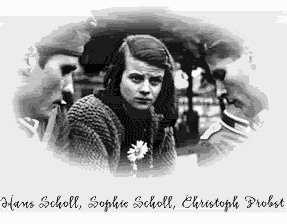|


"If you don't stand up for something,
you will fall for anything" |
Standing up for what you believe in isn't always easy.
Sometimes when you do people will ridicule you for your beliefs.
Imagine living in Nazi Germany and trying to stand up for your beliefs
knowing that you could be arrested and put in jail, or taken to a concentration
camp or executed. The story of "The White Rose" is a story of courage...
It is a story of young people like yourselves who were brave enough to
shine the light of courage in a world of darkness. They were
not Jews. They were Germans and were in no danger from the Nazi Laws...
or were they? In a world where civil liberties and human rights are
violated on the grounds of race, religion, political beliefs, or for whatever
reason may arise...Is anyone really safe? The young people in this
group did not think so. They were among those who felt the
need to stand up for what they believed in, regardless of the consequences.
Please read the following information provided in the hyper link below
and then complete the activity I have outlined.
|
|
|

The Evian Conference,
1938
World Response
"First they came for the Jews"
In Germany, first they came for
The Communist's
And I didn't speak up because I wasn't
a Communist.
Then they came for the Jews,
And I didn't speak up because I wasn't
a Jew.
Then they came for the trade unionists,
And I did not speak up because I wasn't
a trade unionist.
Then they came for the Catholics,
And I did not speak up because
I was a protestant.
Then they came for me,
And by that time there was no one left to speak up.
-Pastor Neirnoeller

"I am only one, but still I am one;
I cannot do everything, but still I can do
something;
I will not refuse to do the something I can do."
Helen Keller |
Class Assignment
Due Date: May 3rd
The information about "The White Rose" is just one example
of non-Jews who tried to stand up to the tyranny of the Third Reich.
I would like each group to make a chart of non-Jewish groups or individuals
who helped Jews during the Holocaust. The chart should show at least
six different groups or individuals and should include, but not be limited
to, the following information: name of individual or group;
country of origin; steps taken to help the Jews; approximate number of
Jews saved; tell what happened to the individual or group that helped.
The charts should be poster board sized and should be of sufficient quality
to display in the classroom when completed. Be prepared to present
you findings in front of the class. This project will require some
research on the Web or at the library.
Class discussion
May3-5
We will be doing some role playing in conjunction
with this project. We will be holding a debate. I want
the class to image that they are non-Jewish citizens of an unnamed town
in an unnamed Nazi-occupied country during the Holocaust. The town
has a large Jewish population, and town leaders have recently discovered
that the Nazis are about to begin deporting the town's Jewish residents
to the death camps/ We will be debating whether or not to help save
the Jews of the town. Each group should prepare arguments to support
their side of the debate. Be specific with the information for your
arguments. Here are some key points to keep in mind if you are arguing
against helping the Jews:
-
What are some of the reasons for helping/not helping the
Jews?
-
What are some of the risks/penalties for helping the Jews?
-
Why do the risks outweigh the benefits?
-
What will non-Jewish residents of the town do while the
Jews are being deported?
-
Provide specific examples of people who have tried to
help Jews during the Holocaust and have been discovered.
If you are arguing in favor of
helping the Jews you should address the following
points:
-
What are some of the reasons for helping the Jews?
-
What are the risks involved?
-
Why do the benefits outweigh the risks?
-
What steps will have to be taken to help the Jews?
-
Provide specific examples of people who have been successful
in helping the Jews during the Holocaust.
I will act as the judge and a panel of your peers (from
another class) will determine which side argued more persuasively.
We will follow the standard debating rules.
|




